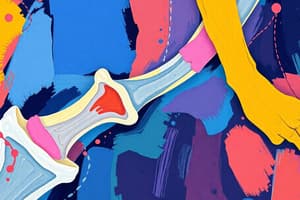Podcast
Questions and Answers
What is the most likely clinical manifestation of hyperkalemia?
What is the most likely clinical manifestation of hyperkalemia?
- Dehydration
- Muscle weakness (correct)
- Excessive urination
- Rapid weight loss
Which of the following is a common cause of fluid excess?
Which of the following is a common cause of fluid excess?
- Diarrhea
- Increased sweating
- Vomiting
- Congestive heart failure (correct)
Which stage of chronic kidney disease (CKD) is characterized by a GFR of 15-29 mL/min?
Which stage of chronic kidney disease (CKD) is characterized by a GFR of 15-29 mL/min?
- Stage 3
- Stage 1
- Stage 4 (correct)
- Stage 2
Which medication is contraindicated in patients with chronic kidney disease due to the risk of further renal impairment?
Which medication is contraindicated in patients with chronic kidney disease due to the risk of further renal impairment?
What is a primary nursing intervention for patients experiencing an upper gastrointestinal bleed?
What is a primary nursing intervention for patients experiencing an upper gastrointestinal bleed?
Which of the following are potential complications associated with osteomyelitis?
Which of the following are potential complications associated with osteomyelitis?
What are common signs or symptoms of sleep deprivation?
What are common signs or symptoms of sleep deprivation?
Which interventions should a nurse prioritize for a post-op patient exhibiting signs of DVT?
Which interventions should a nurse prioritize for a post-op patient exhibiting signs of DVT?
Which factors should be included in patient education about smoking cessation prior to surgery?
Which factors should be included in patient education about smoking cessation prior to surgery?
In the context of fluid and electrolytes, what does metabolic syndrome typically include?
In the context of fluid and electrolytes, what does metabolic syndrome typically include?
What is the primary concern when providing enteral feedings to a patient?
What is the primary concern when providing enteral feedings to a patient?
Which medication-related knowledge is critical for managing pain in post-operative patients?
Which medication-related knowledge is critical for managing pain in post-operative patients?
Which of the following best describes atopic dermatitis?
Which of the following best describes atopic dermatitis?
Flashcards
Types of fractures
Types of fractures
Different ways a bone can break, including transverse, oblique, spiral, comminuted, and impacted.
Osteoporosis
Osteoporosis
A disease where bones become weak and brittle, increasing the risk of fractures.
Osteomyelitis
Osteomyelitis
Infection of the bone.
Compartment Syndrome
Compartment Syndrome
Signup and view all the flashcards
DVT (Deep Vein Thrombosis)
DVT (Deep Vein Thrombosis)
Signup and view all the flashcards
Refeeding Syndrome
Refeeding Syndrome
Signup and view all the flashcards
Parenteral Feeding
Parenteral Feeding
Signup and view all the flashcards
Sleep Apnea
Sleep Apnea
Signup and view all the flashcards
Fluid Imbalances
Fluid Imbalances
Signup and view all the flashcards
Hypo/Hyper/Isotonic IV Fluids
Hypo/Hyper/Isotonic IV Fluids
Signup and view all the flashcards
Chronic Kidney Disease (CKD) Stages
Chronic Kidney Disease (CKD) Stages
Signup and view all the flashcards
Acute Kidney Injury (AKI) Causes
Acute Kidney Injury (AKI) Causes
Signup and view all the flashcards
GI Bleed Assessment
GI Bleed Assessment
Signup and view all the flashcards
Study Notes
Bone Disorders (14 Questions)
- Content/Knowledge Level: Types of fractures (matching), Osteoporosis, Osteomyelitis, Gout
- Application Level: Compartment Syndrome, Osteomyelitis, DVT, Rhabdomyolysis, Case study on Post-op ORIF patient with lower extremity pain and redness (10 points)
- Complication occurring in patient (1 point)
- 3 Nursing interventions required prior to provider notification (3 points)
- SBAR report to provider (6 points)
Perioperative Care (5 Questions)
- Content/Knowledge Level: Patient education (pre-op, post-op, discharge), Smoking cessation, concerning pre-op symptoms, when to start discharge teaching, post-op complications (pneumonia, DVTs), IV and oral pain medications, informed consent regarding surgery vs. surgeon visit.
Sleep (6 Questions)
- Content/Knowledge Level: Sleep apnea (signs, symptoms, treatments-CPAP and non-CPAP), sleep deprivation (signs, symptoms), sleep hygiene (best practices), bonus question: HR changes in age/fitness levels.
Nutrition (4 Questions)
- Content/Knowledge Level: Nursing considerations for parenteral and enteral feedings, patient safety concerns, PPN vs. TPN vs. tube feeds, metabolic syndrome.
- Application Level: Lab values linking to nutritional status; signs and symptoms of low albumin levels, refeeding syndrome.
Skin (4 Questions)
- Content/Knowledge Level: Sunscreen guidance and recommendations, wound healing (smoking impact), general skin considerations, signs and symptoms of atopic dermatitis.
Fluid and Electrolytes (6 Questions)
- Content/Knowledge Level: Differences between hypo, hyper, and isotonic fluids, types of IV fluids (reference electrolyte quick reference guide in D2L), clinical manifestations and causes of hypo/hyper, treatment for hyperkalemia.
- Application Level: Causes of fluid deficit and excess (reference fluid imbalance study guide in D2L), deficit/loss of fluid
Renal (5 Questions)
- Content/Knowledge Level: Labs linking to kidney function and expected lab findings in CKD, causes of types of AKI, clinical manifestations of each phase of AKI, stages of CKD, causes of uric acid kidney stones.
- Application Level: Medications for chronic kidney disease, contraindications for medications, assessment prior to medication administration (lab results, physical assessment).
GU (2 Questions)
- Content/Knowledge Level: Incontinence (differences between types, treatment options, nursing considerations, nursing interventions)
GI (10 Questions)
- Content/Knowledge Level: Lower vs. upper GI bleeds (assessment findings with fluid volume deficit, priority intervention in a patient with a new GI bleed), Crohn's, Ulcerative Colitis, fistulas, GI bleed, GERD (medications/treatments: H2 blockers and PPIs)
- Application Level: Peritonitis treatments (priority), peptic ulcer disease (meds to avoid, risk factors, causes), case study applying ADPIE (abdominal pain).
- Diagnostic studies to determine pain cause (1 point)
- Interventions/treatments predicted for the patient (6 points)
- Anticipated occurrences (untreated) (1 point)
Studying That Suits You
Use AI to generate personalized quizzes and flashcards to suit your learning preferences.
Related Documents
Description
Test your knowledge on bone disorders, including types of fractures, osteoporosis, and osteomyelitis. Additionally, assess your understanding of perioperative care, patient education, and complications post-surgery. Enhance your nursing skills with case studies and interventions.




